| Srl | Item |
| 1 |
ID:
122509
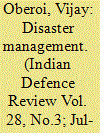

|
|
|
| 2 |
ID:
132494
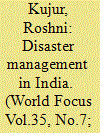

|
|
|
|
|
| Publication |
2014.
|
| Summary/Abstract |
Development and welfare of human beings is intimately related to the natural environment. Normally, environment is a source of livelihood but at times due to the intensive intervene made by human it brings
hazards like earthquake, cyclone, ?ood, landslide etc. further these hazards turns into disasters causing losses of life and property.' These hazards can be minimized by using modern scientific and technological
advancements. Disaster is a sudden adverse or unfortunate extreme event which causes great damage to human beings as well as plants and animals. Disasters I occur rapidly, instantaneously and indiscriminately which wipe out the years of development in a matter of hours. Disaster may be natural or man-made chaos and destruction reigns everywhere. It doesn't only justify initial death and damage occurrence but even the post-disaster tranquility and sufferings that too without any doubt regenerate pain and misery. Around 76% of India's coastline is prone to cyclones and tsunamis, while 59% of the country is vulnerable to earthquakes, 10% to-?oods and river erosion, and 68 %_to droughts? This has been stated by National Policy on Disaster Management that, "Disaster disruptsprogress and destroys the hard earned fruits of painstaking developmental efforts, often pushing nations, in to the quest for progress, back by several decades. Thus ef?cient management of disasters rather than mere response to their occurrence has in recent days received increased attention both in -India and abroad. This is as much a result of the recognition of the increasing frequency and intensity of disasters as it is an acknowledgement that good governance, in a caring and civilized society, needs to deal effectively with the devastating impact of disasters?"
|
|
|
|
|
|
|
|
|
|
|
|
|
|
|
|
| 3 |
ID:
122753
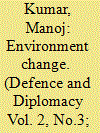

|
|
|
| 4 |
ID:
132484


|
|
|
|
|
| Publication |
2014.
|
| Summary/Abstract |
The study of disasters requires at the outset an understanding of the geographic variability in' the hazards and their impacts; the geographic variability in populations at risk; the vulnerability of population and the context in which these three interact. It is imperative to ?rst understand the meaning of the terms disasters, hazard, risk and vulnerability.
|
|
|
|
|
|
|
|
|
|
|
|
|
|
|
|
| 5 |
ID:
127526
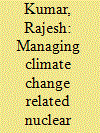

|
|
|
| 6 |
ID:
140042
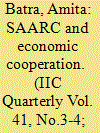

|
|
|
| 7 |
ID:
132491
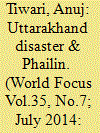

|
|
|
|
|
| Publication |
2014.
|
| Summary/Abstract |
The nature 's fury, that devastated Uttarakhand in June 2013, was considered as unprecedented, though the blame was thrown on the State government and other concerned agencies at Centre and State for failure on numerous fronts including lack of institutional arrangements, dissemination and actions based on early warning, lack of coordination, unorganised response etc. It was also felt by many that the situation would have been same with any other state, had disaster of such magnitude have happened there, unless the occurrence of next big disaster event in Odisha in -the form of Cyclone Phailin, which created a success story in managing disasters. Now the country has two major disasters to compare where disaster management surfaced in two extremes. While Uttarakhand disaster resulted in complete failure, the effective disaster management of Phailin not only made us proud, it also became a benchmark for the whole world.
|
|
|
|
|
|
|
|
|
|
|
|
|
|
|
|